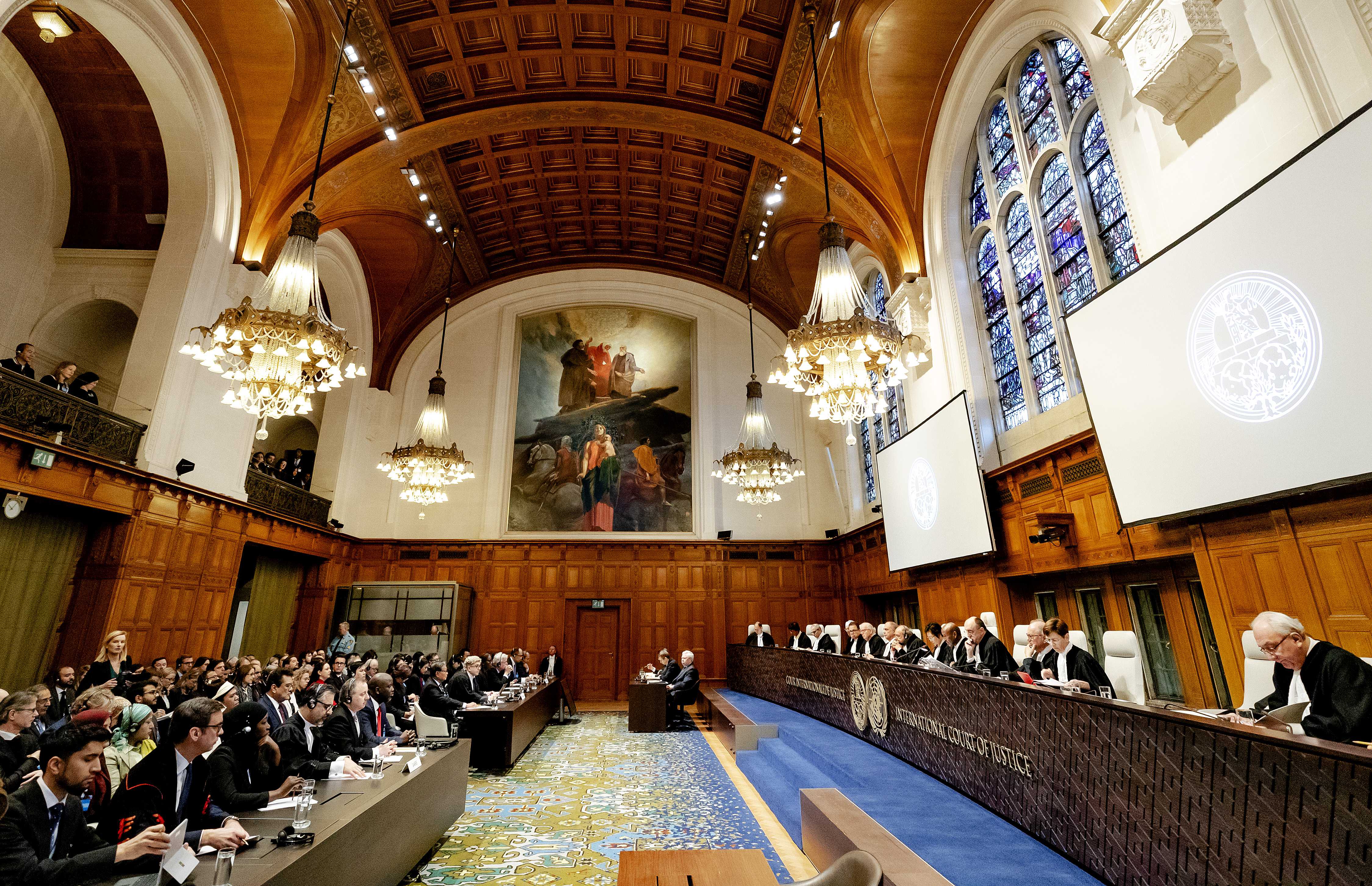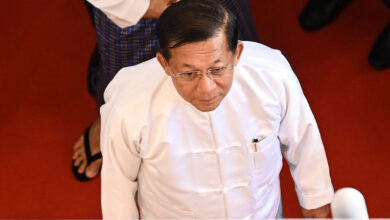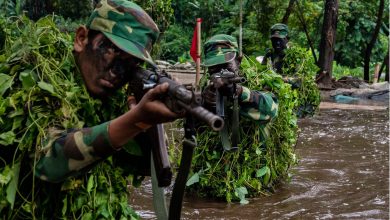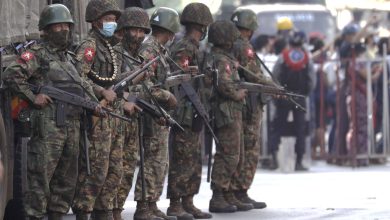
Once again, the people of Myanmar are being denied justice and accountability.
At a week-long public hearing set to begin at the International Court of Justice (ICJ) in The Hague on Monday, the country’s illegal junta will attempt to block the case brought against it by The Gambia for breaching the Genocide Convention during the so-called “clearance operations” in 2017 that drove 750,000 Rohingya into Bangladesh.
The regime’s representatives at the hearing are expected to raise procedural objections to prevent the court moving to the substantive stage of the case, at which point the Rohingya people might expect some form of long-delayed justice.
As if to deliberately mock the international justice system, coup leader Min Aung Hlaing has nominated two individuals accused of committing serious human rights violations and subverting the rule of law—Win Shein, the regime’s minister for planning, finance and industry, and Thida oo, its attorney general—to his ICJ team.
Win Shein has been facing EU and US sanctions since last year, while the US, UK and Canada added Thida Oo to their sanctions lists on the anniversary of last year’s February 1 coup for fabricating charges against State Counsellor Aung San Suu Kyi in an attempt to bar her and other democratic leaders from politics.
Even the junta’s presence at the “principle judicial organ of the UN” is an affront to international law, as it is in violation of a UN General Assembly’s decision to reject the credentials of the military regime and leave the National Unity Government’s (NUG) pick for Myanmar’s permanent representative to the world body, Kyaw Moe Tun, in his seat. This resolution was unanimously endorsed last December by all 193 members of the General Assembly.
By allowing an uncredentialed and illegal military regime to represent the country anyway, the ICJ is not only flouting the decision of the General Assembly, but also undermining the democratic will of the people of Myanmar, who in November 2020 voted overwhelmingly to reject military-backed parties and embrace their country’s transition to democracy. We therefore urge all UN and international organisations, particularly judicial bodies such as the ICJ whose mandates centre on the rule of law, to desist from any action that legitimises the military junta in international affairs.
Moreover, we demand that all UN member states and UN bodies respect the democratic will of the people of Myanmar by recognising the NUG, which the vast majority see as representing their aspirations.
The case for recognition of the NUG was comprehensively made in a landmark legal opinion signed by some of the world’s leading jurisprudential experts last September, and also in a report by the Special Advisory Council for Myanmar, an independent group of international experts.
Significantly, more than 800 Rohingya survivors of genocide represented by the Geneva-based nongovernmental organisation Legal Action Worldwide (LAW) have called on the international community, including through communications to the president of the ICJ, to recognise the NUG as the legitimate government of Myanmar. The Myanmar Accountability Project (MAP)—of which we are executive directors—has also established a petition urging recognition of the NUG.
Many of LAW’s Rohingya clients, who are survivors of sexual and gender-based violence, overwhelmingly support the ICJ case and consistently state that justice, including an end to Tatmadaw impunity, is a fundamental requirement for their return to Myanmar from Bangladesh.
But these Rohingya genocide survivors, along with the rest of Myanmar’s embattled people crying out for an end to the crisis that has overwhelmed their country, are being egregiously failed by the very multilateral institutions responsible for their protection.
The UN Security Council has been neutralised by China and Russia, for whom Myanmar is a backyard for commerce and arms sales. The current chair of the Association of Southeast Asian Nations, Cambodian dictator Hun Sen, was recently rebuffed by Min Aung Hlaing when he attempted to resuscitate the regional body’s five-point plan. And the UN secretary-general’s new special envoy for Myanmar, Noeleen Heyzer, rendered herself hopelessly compromised recently when she suggested that the junta participate in a power-sharing agreement with the NUG.
In the face of these abject failures, Myanmar remains a killing field. The Rohingya’s homeland, Rakhine State, has become a vast prison camp for displaced communities, where the junta continues to act with brazen impunity. In vast swathes of the rest of Myanmar, junta forces are undertaking increasingly desperate rampages against vulnerable communities in ever more futile attempts to bring the country under their control.
Mass murder, summary executions, indiscriminate aerial bombardments and widespread arson attacks are just some of the industrial-scale human rights violations being perpetrated by the leaders of Myanmar’s failed coup.
This brings us back to the ICJ hearing. In 2019, the court unanimously imposed “provisional measures” to prevent any further genocidal acts by the military and to ensure the preservation of evidence related to possible acts of genocide.
Two years on, it’s clear these measures have failed, and that as the court has dragged its bureaucratic feet, the very crimes it is considering have continued in a widespread and systematic manner.
So we urge the ICJ to move beyond procedural wranglings to the substantive hearing of genocide against the Rohingya. The Independent Investigative Mechanism on Myanmar, a massive database of junta crimes, has extensive evidence that would prove decisive in the case against Myanmar’s military leaders.
Most importantly, the Rohingya people must have their day in court, a cathartic moment of truth telling and acknowledgment, and an essential milestone on their long road to justice and accountability.
Even if the court does move to a substantive hearing, a ruling on whether the junta has committed genocide is likely to take years. And so we also urge UN member states to take unilateral and collective steps to bring perpetrators of international crimes to justice and achieve full accountability.
The application of universal jurisdiction, under which perpetrators are pursued in national courts, is one largely untried route to justice in relation to Myanmar. The ground-breaking case by the Burmese Rohingya Organisation UK in Argentina and the criminal prosecutions which MAP will file in the coming weeks are good examples.
There must be more efforts like this to put Myanmar’s generals on notice that they will be held to account and that their days are numbered. Above all, the people of Myanmar must know that their courageous struggle for justice is supported by the outside world and that they are not forgotten.
Chris Gunness is the Director of the Myanmar Accountability Project, where Damian Lilly is Director of Protection.



